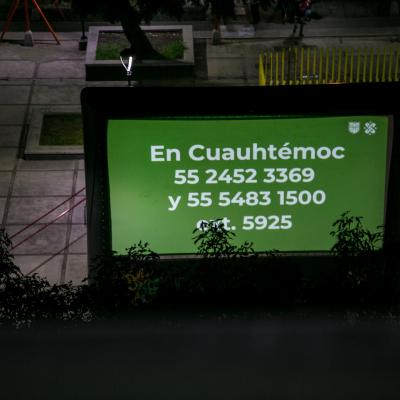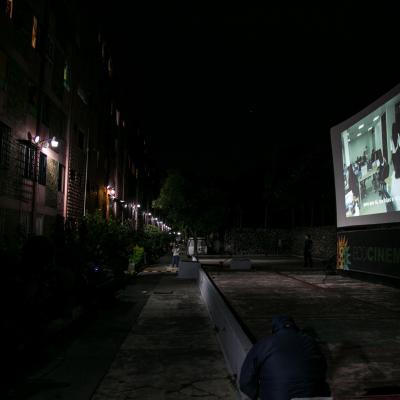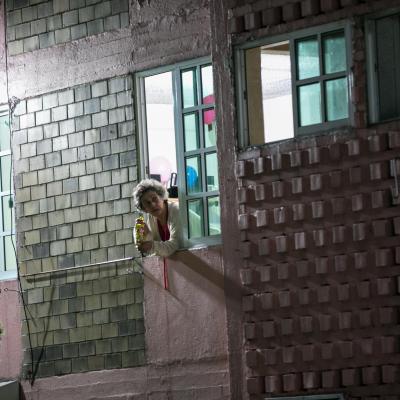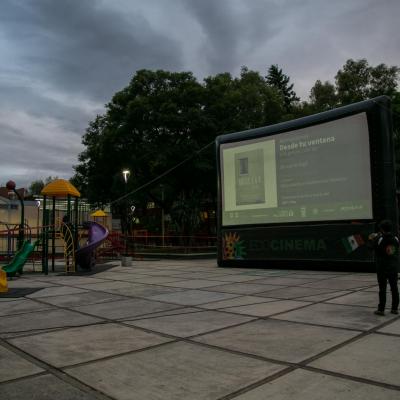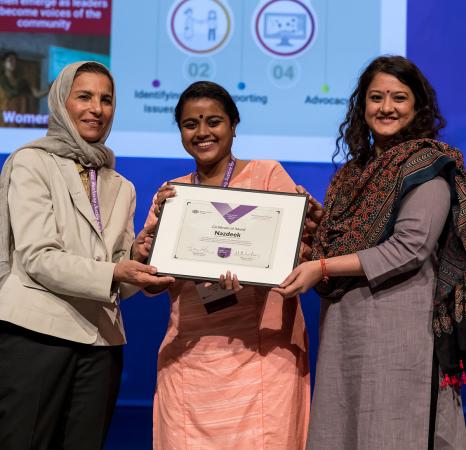Project Pitch and Q&A
Watch UNDP Mexico's World Justice Challenge project pitch and join WJP's World Justice Challenge 2021 Community Forum to ask questions to project representatives, explore additional resources, meet new colleagues, and more. Join the discussion and help us build stronger rule of law values, institutions, and communities around the world.
Ask your question at the Community Forum
Project Summary
The project focuses on preventing and addressing violence against women in Mexico City, a public health problem exacerbated by the COVID-19 pandemic containment measures. The project is based on five strategies: a hotline protocol to assist women at risk and in emergency situations; a community and sorority network to support women; a series of recommendations to strengthen institutional coordination mechanisms; direct financial support for women at risk of violence; and an online training program for public servants. Furthermore, to raise awareness about gender-based-violence in the community, seven outdoor "From Your Window" movie screenings were organized.
Problem Statement
Before the COVID-19 pandemic, Mexico already faced challenges regarding the procurement and administration of justice for women. For instance, in 2016, 43.9% of women had experienced violence by their current or former partner (ENDIREH, 2016); by 2020, 10.6 women were victims of femicide daily (UN Women, 2020). Between January and February of 2020, 9,941 women were alleged victims of intentional injuries. Currently, Mexico is battling two pandemics: the COVID-19 pandemic and the gender-based violence pandemic, the latter being exacerbated by stay-at-home policies. In this context, women victims of domestic, family, and partner violence are not able to access justice or emergency services, and they may face additional obstacles to escape violent situations because they are forced to share a home with their aggressors. Thus, it is vital for essential services to have protocols to prevent, control, and minimize the risk of violence, and, where needed, act against this context.
As a response to the increase of gender-based violence (GBV) and the declaration of the "Gender Alert," and to provide a safe place for women, in 2019, Mexico City's Government and the Secretariat for Women (SEMUJERES) created the LUNAS Units: shelters for women of all ages who have been subject to any type of violence or with job insecurity, offering physiological, legal, and psychosocial support. However, the increase in GBV in the COVID-19 outbreak is putting the LUNAS Units at risk of collapsing. In this regard, UNDP, in collaboration with UN Women in Mexico, designed a project to address GBV in Mexico City during this outbreak to protect women victims of violence that are part of the informal economy, to address discrimination against women and girls, and to strengthen the capacities of first responders to meet growing justice demands concerning GBV.
Project Description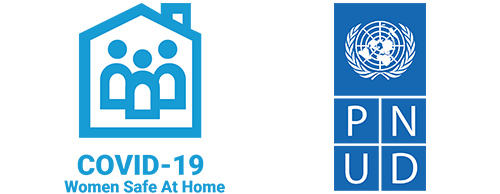
The project was based on the following theory of change: if (a) UNDP supports the Government of Mexico City in the development of attention protocols and coordination mechanisms that avoid revictimization; (b) women are provided with information and timely care in the context of the pandemic, and (c) targeted cash transfers are implemented, then (d) the incidence of domestic and gender-based violence as a consequence of lockdown will decrease, along with the economic vulnerability of women victims of violence who work in the informal sector.
The strategies were:
- Pilot strategy to provide direct economic support to 500 women at high risk of violence. According to pre and post surveys to the 500 beneficiaries, this contributed to their economic independence, autonomy, and access to basic services.
- The awareness strategy, "From Your Window," that reached 1,200 people at seven multi-housing units. The outdoor screening of the film "Intimate Battles" also included a public service announcement regarding emergency services for women.
- A hotline protocol was designed for "Línea Mujeres" (911 to assist women at risk and in emergency situations). The protocol integrated human rights and gender perspectives to help provide remote assistance to victims. 450 first responders were trained.
- A methodology that allows for identification and prevention of gender violence, as well as the referral of victims, was designed, strengthening the exercise of women's rights in general. The value of this methodology is that it integrates sorority, empowerment, and a sense of citizenship in an innovative way.
- Public servants of Mexico City received training on gender, equality, human rights, non-discrimination, and violence against women, integrating their needs and strategies to face the current health crisis. Almost 3,000 people were trained.
- A series of seven webinars called "Attention and Prevention of Violence Against Women and Girls in Mexico City" was offered. These webinars were available via YouTube streaming services and on the social networks of SEMUJERES, the Attorney General's Office, 911 emergency service, "Abogadas de Mujeres" (Women's Lawyers), Locatel (Telephone services for citizens) and UNDP, reaching almost 20,000 views.
- An additional strategy focusing on stress and burnout management was created, aimed at emergency workers dedicated to providing access to justice. Pedagogical materials were created to develop skills to promote self-care and well-being.
- Technology was incorporated into the internal processes of the LUNAS Units for digital case management. This improved the management, response, and follow-up of the cases.
Project Impact and Potential for Scaling, Replication, and Sustainability
The project, "COVID-19: Women Safe at Home," has already raised a lot of interest from donors, allowing the continuity of the project's impact and its scaling. On the one hand, the Department of Political and Peacebuilding Affairs of the United Nations Secretariat contributed some small funding for working in an Early Alert System for gender-based violence in Mexico City. Also, this grant allowed us to train women on gender-based violence (GBV) and provided skills to create a political agenda with a human rights, gender, and 2030 Agenda perspective, all in the context of the biggest electoral process in Mexico, on June 6th. So far, we've trained almost 10,000 women. Additionally, the Spanish and Mexican Agencies for International Development Cooperation (AECID and AMEXCID) provided additional funding to develop a bot to guide women seeking emergency attention regarding GBV, as well as their neighbors and family witnessing this kind of violence, to strengthen the 911 "Línea Mujeres," including psychologic attention. These funds will also allow us to work with media outlets, providing them with the tools necessary to include gender perspective when covering emergencies. This is relevant because Mexico City is very vulnerable to natural disasters (earthquakes, flooding); therefore, those tools could help not only in a context of sanitary crisis, but for other emerging crises.
The sustainability of the project stands on the political will and the impartiality of the international organizations, government institutions, and civil society organizations behind it. This allows to us plan and execute with the only goal of benefiting women's needs.
The project can be replicated within any local government in the country, since GBV and the economic vulnerability of householder women are rising. Also, it can be scaled in those municipalities with big increases in emergency calls and complaints regarding GBV from March 2020 to February 2021, focusing on those with a Gender Alert (an emergency mechanism designed by the Mexican government to address the elevated risk of femicide violence in a specific state or municipality).
Featured Resources
- Manual for Creating Women's Community Networks (PDF - Spanish)
- "COVID-19: Seguras en Casa" Press Conference (Spanish)
- Webinars (Spanish)
Key Project Links
Social Media: Facebook, Twitter, YouTube, Instagram
Website: mx.undp.org
Submit Your Questions and Get Ready to Pick a Winner!
Representatives of World Justice Challenge 2021 finalist projects are on hand to answer your questions. Join our online Community Forum to engage with finalists, share resources, and network with other members of the rule of law community. Submit your questions now and get ready to vote for your favorite project—voting opens in mid-April!
Join the Conversation
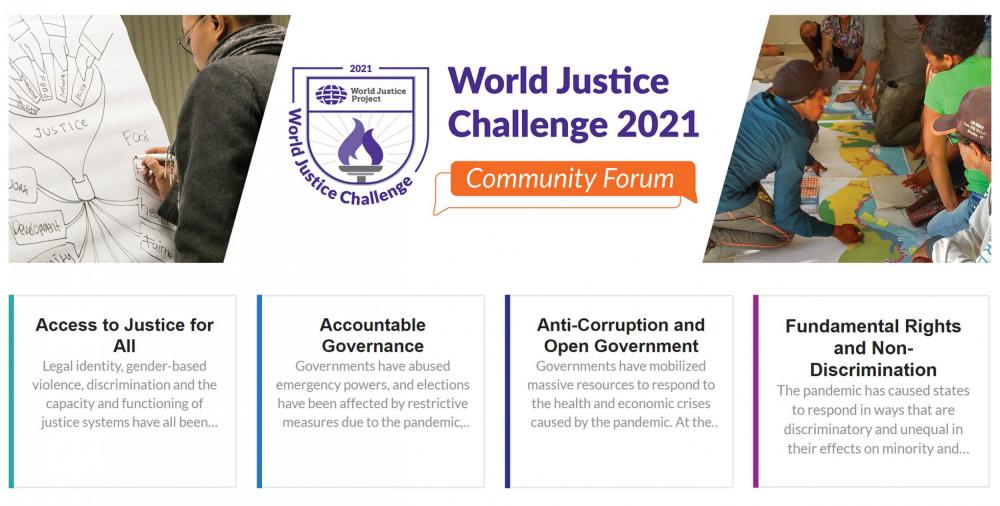
Program Photos
(Click to expand)
